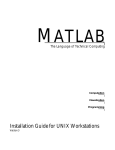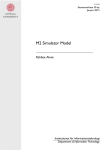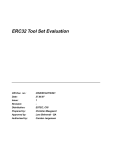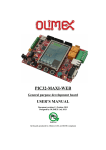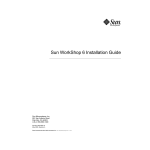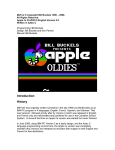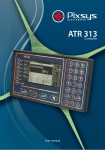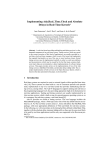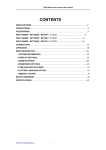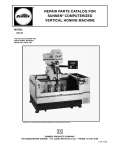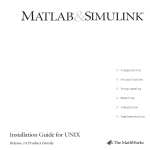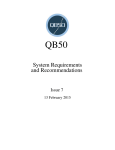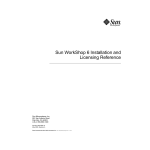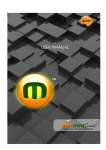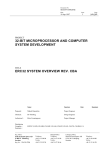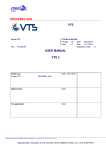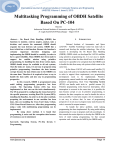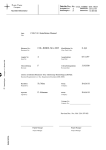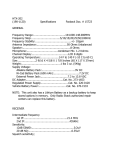Download ERC32 Evaluation Report
Transcript
TR0177 Issue 1 February 1998 Page 1 of 26 ERC32 Evaluation Report ERC32 Evaluation Report Prepared By: Date: 10-Feb-98 Date: 10-Feb-98 J S STEVENS Approved By: R J DURRANT © MATRA MARCONI SPACE UK Limited 1998 Matra Marconi Space UK Limited owns the copyright of this document which is supplied in confidence and which shall not be used for any purpose other than that for which it is supplied and shall not in whole or in part be reproduced, copied, or communicated to any person without written permission from the owner. MATRA MARCONI SPACE UK Limited P.O. Box 16, Filton, Bristol, BS12 7YB TR0177 Issue 1 February 1998 Page 2 of 26 ERC32 Evaluation Report Document Change Log Issue Date Pages 1 Feb. 98 All Notes Initial issue ERC32 Evaluation Report TR0177 Issue 1 February 1998 Page 3 of 26 CONTENTS LIST 1. INTRODUCTION AND OBJECTIVES......................................................................................... 4 2. INSTALLATION OF THE TOOLS ............................................................................................... 5 2.1 THE ADA COMPILATION TOOLS........................................................................................... 5 2.2 THE SIMULATOR AND TIMING TOOLS................................................................................ 5 2.3 THE FLEXLM LICENSE TOOLS............................................................................................... 5 3. THE SOHO AOCS SOFTWARE ................................................................................................... 7 3.1 NORMAL MODE TASK TABLE ............................................................................................... 7 3.2 ADDITIONAL SOFTWARE REQUIRED. ................................................................................. 7 4. THE COMPILATION PHASE ....................................................................................................... 8 4.1 SPECIFIC PROBLEM AREAS.................................................................................................... 8 5. BINDING ......................................................................................................................................... 10 6. WCET EXTRACTION .................................................................................................................. 11 6.1 COMPILER ................................................................................................................................ 11 6.2 BINDER...................................................................................................................................... 12 7. COMPILATION TOOL OBSERVATIONS................................................................................ 14 8. THE HRT TOOLS.......................................................................................................................... 15 9. LINKING......................................................................................................................................... 16 10. THE SIMULATOR ...................................................................................................................... 17 11. CONCLUSIONS AND RECOMMENDATIONS...................................................................... 18 11.1 CONCLUSIONS....................................................................................................................... 18 11.2 RECOMMENDATIONS .......................................................................................................... 18 ERC32 Evaluation Report TR0177 Issue 1 February 1998 Page 4 of 26 1. INTRODUCTION AND OBJECTIVES At the ERC32 Products day in October 1996, at ESTEC, an ERC32 Evaluation Programme was announced. MMS UK, Bristol, applied to take part in this programme and submitted a proposal, in the form of a Technical Annex, which described the work to be done and identified the support required from ESTEC to facilitate the evaluation. In summary, the objectives of the evaluation were: • select an appropriate software system as an example; the SOHO AOCS software was proposed, with the Normal mode subset being selected, to keep the project to a manageable size. • replace the SOHO cyclic scheduler by Ada tasking. • re-implement assembler objects; simulate external interfaces. • compile all Ada files. • Derive WCET information and evaluate HRT tools. • Link application, using ESTEC facilities. • Evaluate Target Simulator. In addition it was intended to attend the ERC32 training day at ESTEC; in the event this was not possible, due to the illness of the evaluator, so all training was carried out from the user manuals supplied with the software. The remainder of this report describes the work carried out under the evaluation programme. ERC32 Evaluation Report TR0177 Issue 1 February 1998 Page 5 of 26 2. INSTALLATION OF THE TOOLS In order to evaluate the ERC32 tools provided by Aonix and Spacebel, it was necessary for them to be installed on a suitable workstation. The unit chosen was a SPARCStation 5, currently in use as a software development workstation on the XMM and Integral projects. Thus the evaluation was run concurrently with ongoing work using the TLD Ada compiler for 1750A and the IPL AdaTEST tools. The steps taken to install the tools are described in the following sections. 2.1 THE ADA COMPILATION TOOLS These were installed as follows: 1. The spbrx disk usage was examined and /user identified as an area with adequate available space for the installation. 2. A directory /user/erc32/alsyscomp was created to hold the compiler tools. 3. The installation script was extracted from the tape and run. 4. The environment variable ALSYCOMP was set up, using the .cshrc file. This directory was also added to the path variable. 5. Links were set up in /usr/lib/X11 to the AdaWorld resource and key symbol files. 6. The license file entries provided by Aonix were added to the license.dat file, as described in section 2.3 below, and the license manager forced to reread this file. Appropriate entries were observed in the license.log file. Following these steps, the AdaWorld for Motif GUI ran successfully and it was possible to create families and libraries. A simple Ada source file was created and successfully compiled, with appropriate check out and check in entries appearing in the license.log file. 2.2 THE SIMULATOR AND TIMING TOOLS These were installed as follows: 1. A directory /user/erc32/hrt_tools was created to hold the Spacebel tools. 2. The 3 tar files HRT_2_2.tar, TS_2_2.tar and Tools.tar were extracted from the 8mm tape, mounted on a remote Sun workstation. 3. The tar files were unpacked, creating the various subdirectories needed to hold the executables and support tools. 4. The environment variables needed were set up, using the .cshrc file, and the path variable was modified to include the hrt_tools/bin directory. 5. The license file entries provided by Spacebel were added to the license.dat file, as described in section 2.3 below, and the license manager forced to reread this file. Appropriate entries were observed in the license.log file. The installation was then tested by running the Motif GUI versions of the tools and observing that they started and terminated successfully, with appropriate check out and check in entries appearing in the license.log file. 2.3 THE FLEXLM LICENSE TOOLS The machine on which the tools were evaluated was already running the FLEXlm license management software. It was already serving licenses for 2 products, the IPL AdaTEST suite and the Sun C/C++ compiler. In order to do this the license server is started automatically at reboot. This is achieved by 2 scripts, K17lmgrd and S17lmgrd, in the directory /etc/rc3.d. These files contain the following environment variable settings: ERC32 Evaluation Report TR0177 Issue 1 February 1998 Page 6 of 26 LIC_DIR=/opt/SUNWspro/SunTech_License LIC_BIN=/export/home/AdaTEST/3.0/lmgr The script tests for the existence of various files and then executes the following: $LIC_BIN/lmgrd -c $LIC_DIR/license.dat > $LIC_DIR/license.log 2>&1 & This starts the license manager program, version supplied by IPL, using license.dat and license.log files in the Sun tools directory. The license.dat file contains the following: SERVER spbrx 80787694 7323 DAEMON ipld /export/home/AdaTEST/3.0/lmgr/ipld DAEMON suntechd /opt/SUNWspro/bin/suntechd /opt/SUNWspro/SunTech_License/options.dat FEATURE ATI ipld 3.000 1-jan-0 1 0BAC60814218CEB865E1 VENDOR_STRING=12c ck=23 FEATURE ATS_Compile ipld 1.000 1-jan-0 1 CBACC011216D16A1F2A2 \ VENDOR_STRING=12c ck=3 FEATURE ATS_Recompile ipld 1.000 1-jan-0 1 AB6CE041A4ACBB2B6066 \ VENDOR_STRING=12c ck=61 FEATURE ATS_TSP_Gen ipld 1.000 1-jan-0 1 5BDC00B1DF6C47285D4F \ VENDOR_STRING=12c ck=17 FEATURE ATS_TS_Gen ipld 1.000 1-jan-0 1 8BDCE0A144823FAE48F0 VENDOR_STRING=12c ck=64 FEATURE FDS ipld 1.100 1-jan-0 1 BB7C1041DD97E46C26BD VENDOR_STRING=12c ck=250 FEATURE sunpro.cc suntechd 3.01 01-jan-0 1 2B0A6021E06EBA264557 "" # Serial number: 12660-16301-4 FEATURE sunpro.sparcworks.tools suntechd 2.01 01-jan-0 1 2BDA3031D4792AA98569 "" # Serial number: 87443-16201-1 In order to add the new ERC32 tools, it was necessary to add the daemon and feature lines for these tools to this file and restart the license manager. ERC32 Evaluation Report TR0177 Issue 1 February 1998 Page 7 of 26 3. THE SOHO AOCS SOFTWARE This is a complex on board software application which can operate in a number of modes, corresponding to operational spacecraft modes, such as Initial Sun Acquisition, Roll Manoeuvre Wheels and so on. The software facilities which are required are provided by a number of objects which group together associated data and functions, such as Sensor_Processing, Actuator_Processing and Control_Laws. The processing which is to be carried out in each mode is programmed by an explicit scheduler, of the frequency and phase type. In order to change modes, the scheduler table is changed to that for the new mode (tasks at the beginning and end of each table look for mode change commands, check that the requested transition is permitted and carry out any transition actions, variable initialisation etc.). Since one of the objectives of the evaluation was to replace the scheduler by the use of Ada tasks, it simplifies the activity significantly if the mode changing mechanism is omitted and just one mode is reproduced, with the scheduler and its table replaced by explicit tasks. After some study, the Normal mode was selected; this requires activity from most objects and is therefore representative of all the modes. The study of what software was required began with the normal mode task table. 3.1 NORMAL MODE TASK TABLE The table in Appendix A was extracted from the SOHO file ASW_CTL_ASM.MAC, which contains the task tables for all the modes. Each task is defined by 3 entries: • procedure to be called - a label pointing to the start of a parameterless procedure. • phase - offset of the task from the start of scheduling, in scheduler ticks. • frequency - task repetition interval, in scheduler ticks. The table has been simplified by combining strings of unused entries (which all point to a null procedure). Columns have been added which show: • the file/package where the procedure is defined. • packages which are WITH'd by that package. In the case of the file names, the full file name is found by adding _AUX1.ADA (package specification) or _AUX1B.ADA (package body). The WITH'd packages are only listed the first time a particular file is referenced. 3.2 ADDITIONAL SOFTWARE REQUIRED. The first table in Appendix B lists, for each of the WITH'd packages in the scheduler table, the file in which they are found and any packages which are in turn WITH'd in that file. Those WITH'd packages not already listed are shown bold. The remaining 2 tables show how the WITHs were followed to determine the complete set of files required to implement normal mode. The consolidated list of files appears in Appendix C, where the files are grouped by object. The standard set of files used in SOHO to implement an object is also defined in Appendix C. Having determined the set of files needed to implement Normal Mode, these were transferred from the VAX, where SOHO software development was carried out, to the Sun workstation being used for the evaluation. The final implementation comprised 70 source files, as against 120 in the original SOHO application. ERC32 Evaluation Report TR0177 Issue 1 February 1998 Page 8 of 26 4. THE COMPILATION PHASE After successful transfer of all the required files to the workstation, compilation was begun. This was started at the lowest level where only predefined packages were WITHd, then working back up the WITH chain, until the top level was reached. For some objects, particularly those in the lowest layer of the software, some procedures and functions were originally implemented in assembler. In these cases, the assembler bodies were replaced by Ada bodies. In most cases these were non-functional, due to lack of time and unavailability of an ERC32 assembler, although a functional implementation was possible in a few routines. There were a number of general problems which arose, primarily due to differences between the compiler originally used on SOHO (TLD) and the Aonix compiler. • System.Unsigned - in the TLD package System, there is an unsigned type declared, which is basically a 16-bit positive integer. This did not exist in the Aonix System package. • Package Machine_Code - this TLD package permits direct insertion of single machine instructions in an otherwise Ada implemented unit. • Package Bitops - this TLD package, which makes extensive use of assembler, allows various logical operations to be performed on integer variables. These problems were all solved in a similar fashion: special ERC32 versions of the 3 packages were created, with declarations of the appropriate types and operations. In general these were nonfunctional, for example returning the left hand of a pair of operands input to a Bitops operation. The Unsigned type was declared in the same way as in TLD package System. In each module which used one of the problem types or operations, the relevant package WITH was changed to the ERC32 version (in some cases, ERC32_System was added, as some other facility of System was used as well as Unsigned). 4.1 SPECIFIC PROBLEM AREAS As well as the general problem areas discussed above, which occurred in many objects, there were some specific problems in limited areas. These were: • address calculations - these were associated with telemetry buffers and a thruster control block. In the TLD package System, Address is declared as a subtype of integer. Thus type conversions to and from integer are permitted, whereas in the ERC32 package System, Address is declared as a private type. In fact some limited address arithmetic operations are declared, but to use these would require extensive rewriting of the code. • unchecked conversions as assignment targets - the following code section demonstrates this. Formatted_Torque := System.Unsigned(abs(Fix(Wheel_Torque(n) * Scale_Factor))); declare -- local block to perform bit manipulation on Formatted_Torque subtype Bit_Index is Integer range 0..15; MSB : constant Bit_Index := 0; type Boolean_Array_Type is Array (Bit_Index) of Boolean; Pragma Pack (Boolean_Array_Type); -- pack into one word function CUB is new Unchecked_Conversion (Source => System.Unsigned, Target => Boolean_Array_Type); ERC32 Evaluation Report TR0177 Issue 1 February 1998 Page 9 of 26 begin -- set bit 7 of Formatted_Torque to sign of Wheel_Torque(n) CUB(Formatted_Torque)(7) := (Wheel_Torque(n) < 0.0); end; -- local block In this case the variable Formatted_Torque is an unsigned 16 bit quantity, where the lower byte represents magnitude and the lowest bit of the upper byte represents sign. A local type declaration provides an alternative representation as a Boolean array, allowing a direct assignment to the sign bit. This is accepted by the TLD compiler but not the Aonix one, presumably because the left hand side contains a function. However it is not really a function, but merely a way of transforming a variable type. Whether this is legal Ada is debatable. • type conversions between an enumerated type and integer - this is shown in the following code fragment: type FPSS_Data_Error_Type is (OK, Bad_Ap, Bad_Ay, Bad_Angle_P, Bad_Angle_Y, No_Sun_P, No_Sun_Y); for FPSS_Data_Error_Type use (0, 1, 2, 4, 8, 16, 32); function CFI is new Unchecked_Conversion (Source => FPSS_Data_Error_Type, Target => Integer); function CIF is new Unchecked_Conversion (Source => Integer, Target => FPSS_Data_Error_Type); The use of these functions is rejected by the Aonix compiler as an “Implementation restriction”. This seems an unreasonable restriction. A similar problem occurred with integer to Boolean conversions; this seems a more reasonable restriction, though. The use of this conversion depended on knowledge of how a Boolean is represented by the compiler, whereas in the enumeration case the designer has specified the implementation explicitly. • size differences in the implementation of types - the TLD Long_Integer type has no direct equivalent in ERC32; the 32 bit word length means that many types, and quantities like Storage Size, are different from the equivalents in the 16 bit 1750A system. Various means were used to overcome these problems, some functional and some non functional. For example, Long_Integer was simply replaced by Integer and units of Storage Size were adjusted to allow a successful compilation. The use of unchecked conversion shown above was replaced by the use of ‘pos and ‘val attributes (although this led to problems later). ERC32 Evaluation Report TR0177 Issue 1 February 1998 Page 10 of 26 5. BINDING Initial attempts at using the binder were made early in the compilation process, to determine how it worked, what reports were produced etc. The first full bind was made when the complete source file set had been compiled (although some package bodies still had problems). The bind under these conditions was unsuccessful, as expected, with the erroneous units flagged as missing. The SOHO software follows a consistent style, where separate packages are declared for different kinds of data; these packages have specifications only. Although the library manager shows uncompiled bodies for these packages, the binder reports that they are not compiled but not required, as expected. Once the errors had been removed from the package bodies, and they had been recompiled, the binder ran successfully, generating a report showing units used, offsets of units etc., and producing a ‘.o’ file. ERC32 Evaluation Report TR0177 Issue 1 February 1998 Page 11 of 26 6. WCET EXTRACTION 6.1 COMPILER Once a successful bind had been achieved at the functional level, the Worst Case Execution Time (WCET) extraction was attempted. To do this, the compiler WCETE option was turned on and all files recompiled, using AdaMake. This took about 5 minutes for the 70 source files involved. WCET errors were reported in 8 source files. Some of these are listed below: • compound assignments - a typical case is shown below. 352 MACS_Error_Data := (Counter => 0, Time => 0, First_Error => True); 353 354 On_Time_Increment := (others => 0); --(array (1..8) of natural) 1 1 *COD WCETE subset warning: This construct is not permitted in the WCET Ada HRT Restrictions. The containing subprogram must not be called within the main body of a critical task. The first compound assignment, at line 352, is accepted but the one at line 354 is not. The offending item, in this and other cases, seems to be the ‘others’ assignment. In this case, as shown, the data item is an array of 8 natural numbers. The reason given in the manual for exclusion of these constructs is that execution time must be bounded. The array bounds are fixed, and so the execution time is determinable; indeed, the compiler presumably generates the required code sequence quite happily, probably as a ‘for’ loop, so should be able to determine its execution time. • ‘pos attribute - this was introduced to overcome a functional problem (see section 4.1 above) but was rejected on timing grounds. While it is clear that some attributes may be slow to calculate, this particular one is just a type conversion between a value of a discrete type and its position in the series, which will generally be a simple relationship. • loops with parameter as an upper limit - clearly this is a problem for the compiler, which cannot know at compile time what the loop limit will be. A pragma Loop_Count is mentioned in the user manual to allow the designer to provide this information; unfortunately this is not implemented in the prototype tool, so the problem was overcome by coding hard values for the upper limits. • Raise statements - exception handling is clearly capable of unbounded execution time and so is not permitted. The code fragment given, however, shows that there is no explicit raise statement in the code rejected: 102 -- function Arctan(X : in Float) return Float is 103 104 begin 105 106 if abs(X) < X_Small then 107 108 return X; 1 2 1 *COD WCETE warning: Block containing explicit raise statement been excluded from worst case path analysis. has 2 *COD WCETE warning: Block containing explicit raise statement has been excluded from worst case path analysis. It is assumed that the raise statement is in the code implementing the ‘abs’ statement, which is part of the supplied run time library! ERC32 Evaluation Report TR0177 Issue 1 February 1998 Page 12 of 26 A further problem was the location and style of the task declarations, introduced to replace the operation of the original cyclic scheduler. These had originally been declared in a procedure, but were moved to a standalone package after rejection by the compiler on HRT grounds. This package was in turn WITHd by the package containing the main program. The tasks were written in a standard style, based on that defined in the user manual: task body Mode7_Ctl_task is use Real_Time; Phase : constant Time_Span := Milliseconds(30); Period: constant Time_Span := Milliseconds(50); Next_Time: Time; begin Next_Time := Clock + Phase; Delay_Until(Next_Time); loop Attitude_Control.Do_Mode7_Pitch_Ctl; Attitude_Control.Do_Mode7_Yaw_Ctl; Next_Time := Next_Time + Period; Delay_Until(Next_Time); end loop; end Mode7_Ctl_task; The values for phase and period were based on those used in the original frequency and phase scheduler. The statements prior to the loop ensure that the task is initially released with the correct delay. Within the loop, the procedures to be executed are called in the correct sequence, the next time at which the task should be run is calculated and used in the Delay_Until statement. The procedures called in a particular task are all those from the original scheduler table which have the same frequency and phase, and would therefore have run in the same slot. 6.2 BINDER Before correcting the deficiencies flagged up by the WCET compilation, a bind was attempted, with WCET processing enabled in the binder. This flagged up just 3 problems - the remaining problem areas flagged by the compiler were presumably in procedures not called in Normal Mode. These were: • Issue_RD in MACS object, undefined loop counts. Replaced by hard coded value. • Read_FPSS in AOCS_Units, a compound assignment. Rewrote as set of individual assignments. • Process_FPSS_Data in Sensor_Processing, a ‘pos attribute. Replaced by Fixed value. With these problems corrected, and the units recompiled, the bind stage ran successfully, producing an execution skeleton file. Initially 3 tasks had been introduced; more were added, recompiling and binding as required, until a total of 10 tasks were implemented, representing most of the original Normal Mode activities, excluding telemetry. A comparison was made between the execution times generated by the tool and those in the original SOHO budgets document, shown in the following table. Task FPSS_Task Mode7_Ctl Control laws Control laws HK Mode7 roll ERC32 5157 1134 1989 2124 473 SOHO 955 400 4411 568 153 ERC32 Evaluation Report SSU7 SSU Data SSU8 RSL Wheel Total 2280 2408 119 202 2530 18416 TR0177 Issue 1 February 1998 Page 13 of 26 2103 3063 42 107 2160 13962 This shows the ERC32 values to be roughly the same as the original SOHO figures; however it should be noted that the ERC32 clock frequency was assumed to be 1 MHz, whereas the SOHO figures were for a MAS281, running at 15 MHz, with 3 memory wait states. This demonstrates the increase in CPU power available with the ERC32 processor. ERC32 Evaluation Report TR0177 Issue 1 February 1998 Page 14 of 26 7. COMPILATION TOOL OBSERVATIONS The compiler, binder and library manager tools were mostly invoked using the Motif X-Window interface, with the tools running on a SPARCStation and the display on a Pentium PC, using the Exceed X-Windows emulator. Under these conditions the tools were very easy to use. Advantage was taken of the ability to set defaults for the tools and then save the environment, which was reloaded on subsequent occasions. Compiler error messages were generally found to be helpful, providing an LRM reference which usually resolved the problem. The AdaMake utility was found to be very helpful, always determining which units needed recompiling and in what order. Some minor points were noted where improvement could be made: • units obsoleted by a source code change were deleted from the library listing. It would be better if they were left in the listing but marked as obsolete. The fact that AdaMake was able to determine the need for recompilation indicated that they were still known to the library manager. • it appeared impossible to print from the Motif Library Manager window. A print could be obtained by using the command line version. • a locked library, due to a system crash, caused the Motif Library Open command to hang. The library could only be unlocked from the command line interface. • a successful compilation produced no effect in the AdaWorld window; this made it hard to know when a compile had completed, especially since the iconified compile window did not change colour until after it had been browsed. ERC32 Evaluation Report TR0177 Issue 1 February 1998 Page 15 of 26 8. THE HRT TOOLS Once a successful bind had been carried out, with WCET processing enabled, this generated the first item of information needed by the HRT tools, namely the execution skeleton, contained in the ESF file. The second file required by the tools is the user configuration file (UCF); the format of this file was identified from the examples provided with the tools. It firstly gives the user preferences for scheduling model and blocking protocol, then provides general target information (clock speed, wait states, priority levels available); finally it lists the threads in the application, with their criticality, period, deadline and offset. The UCF file was constructed by taking the header from the sample file and the thread list from the ESF file. DMS scheduling was chosen and the target information was set to 1 MHz, no wait states. The thread information was generated from the original SOHO scheduler table: • criticality - all were classed as hard. • period - the period from the original table, converted to clock ticks. • deadline - the end of the slot in which originally scheduled, in clock ticks. • offset - the beginning of the slot in which originally scheduled, in clock ticks. The final information required by the tools is a run time file; this was copied from the demonstration example. Next the analyser was run; this showed the thread set to be schedulable, with a total utilisation of around 52%. Finally the scheduler simulator was run and a GANTT chart of the process set obtained. As is to be expected, this was very similar to the original frequency phase scheduler pattern; it is shown in Appendix D. The HRT tools were found to be easy to use and worked well. It was not possible given the limited time available to attempt to prove whether the tools were providing a correct analysis of the real time properties of the software. Qualitatively, however, they give results which are reasonable. ERC32 Evaluation Report TR0177 Issue 1 February 1998 Page 16 of 26 9. LINKING The evaluation was originally set up on the understanding that the Microtec linker was not available for free evaluation and that the linking would have to be carried out using the ESTEC copy of the tool. Accordingly ESTEC set up accounts and access codes to allow this to be done. Due to later changes in the MMS Internet access methods, it was likely that the remote login would no longer work; in any event the time available for the evaluation became too short for this to be attempted. Since a successful bind had been carried out, however, the resulting COFF format object file was taken to ESTEC when attending the Evaluators Workshop and a link carried out on site. Although the link appeared to work, running the resultant executable on the simulator revealed a problem. This was diagnosed by Mr Vardanega (ESTEC) as being due to insufficient heap space. On return to Bristol, a modified configuration file was installed and a new bind carried out. The resulting object file was e-mailed to Mr Vardanega, who relinked it. The resulting executable appeared to run successfully. Thus it can be concluded that, given a full installation including the Microtec linker, this stage would not present any problems. ERC32 Evaluation Report TR0177 Issue 1 February 1998 Page 17 of 26 10. THE SIMULATOR Since a linked executable was not obtained until the Evaluators Workshop, very little evaluation of the simulator has been possible. Although the Spacebel evaluation license was granted to the end of February, the Aonix license expired at the end of January. It therefore proved impossible to evaluate the connection of the simulator to AdaProbe, which in any event is quite complex to set up. The executable was loaded into the simulator in standalone mode and appeared to run, although with some problems. ERC32 Evaluation Report TR0177 Issue 1 February 1998 Page 18 of 26 11. CONCLUSIONS AND RECOMMENDATIONS 11.1 CONCLUSIONS The evaluation proved a good introduction to the commercially available ERC32 software development toolset, although the time constraints imposed by the evaluator’s illness made the final stages somewhat rushed, and therefore less useful. Many of the problems encountered in the evaluation were due to it being a porting exercise; a system implemented from scratch using these tools would not encounter many of these problems. The ERC32 tools were generally felt to be of production quality, except for a few aspects covered in the next section. 11.2 RECOMMENDATIONS The Aonix tools, being based on a standard commercial package, were generally complete. The WCET processing elements, however, were only in prototype form and were incomplete. Efforts should be made to generate a full production version. Typical aspects which are incomplete are the implementation of special pragmas (e.g. Loop_Count) and the generation of reports including full timing information. The Preliminary User’s Guide to the WCET processing indicates some constructs which will not be permitted in software being developed using the HRT method. It is felt that the full set of forbidden constructs is too conservative and may be motivated by implementation difficulties as much as HRT considerations. A case in point is the banning of compound assignment statements, especially where they contain “others” clauses (see section 6.1 above). Since the compiler is able to generate code for these constructs, it should be possible for bounded execution time to be calculated too. The need to have to write out individual assignment statements for each element is inelegant and makes the code more difficult to understand. ERC32 Evaluation Report Appendix A TR0177 Issue 1 February 1998 Page 19 of 26 Normal Mode Task Table Mode_Tables_NM EQU * Table entries DATAT I31$Check_Mode File ASW_CTL -- 0 DATAT DATAT DATAT DATAT DATAT DATAT 1 5 I31$Initialise_NM -- 1 1 -1 E33$Synchronise_ASW_To_TM -- Sync_ASW_Task_Index DATAT -1 DATAT -1 DATAT E341$Do_Mode7_Entry_Function -- 3 DATAT DATAT DATAT DATAT DATAT DATAT 1 -1 E341$Execute_PCPG 2 50 E32$Handle_ASW_TC DATAT DATAT DATAT DATAT DATAT DATAT 6 5 E33$Report_ARD 1 50 E23$Read_FPSS DATAT 3 DATAT 5 DATAT E342$Acquire_SSU_Data DATAT DATAT DATAT DATAT DATAT DATAT DATAT DATAT DATAT DATAT DATAT DATAT DATAT DATAT DATAT DATAT DATAT DATAT DATAT DATAT DATAT DATAT DATAT -- 4 -- 5 WITHd packages Bitops, SWS_Functions, Attitude_Control, TC_AUX3, Actuator_Processing_AUX3, Unchecked_Conversion - ditto - HK System, SWS_Functions, Attitude_Control, Unchecked_Conversion C_LAWS System, Bitops, SWS_Functions, Math_Utilities, Sensor_Processing, Actuator_Processing, Unchecked_Conversion , Control_Laws_AUX3 - ditto - TC Bitops, System, SWS_Functions, Attitude_Control, TC_AUX3, Unchecked_Conversion, Control_Laws_AUX3 -- 6 HK -- 7 AOCS Bitops, HW_Addresses, SWS_Utilities, IOS_Functions, HW_Addresses_AUX3, Unchecked_Conversion, AOCS_Units_AUX2 SP Bitops, SWS_Functions, Math_Utilities, Unchecked_Conversion, Math_Utilities_AUX3, System -- 8 2 10 E341$Do_Mode7_SSU_SEU_Check -- 9 2 50 E342$Perform_SSU3 -- 10 2 50 E342$Process_FPSS_Data -- 11 3 5 E342$Perform_SSU7 -- 12 1 1 E341$Do_Mode7_Pitch_Ctl -- 13 4 5 E341$Do_Mode7_Yaw_Ctl -- 14 4 5 E341$Do_Mode7_Roll_Ctl -- 15 4 50 C_LAWS SP - ditto - - ditto - C_LAWS - ditto - - ditto - ERC32 Evaluation Report DATAT E343$Compute_Control_Law_Torques -- 16 DATAT DATAT DATAT DATAT DATAT DATAT DATAT DATAT DATAT DATAT DATAT DATAT 5 5 E343$Send_Wheel_Commands -- 17 5 5 E342$Perform_SSU8 -- 18 5 50 E341$Perform_RSL_Common_Fn -- 19 93 100 E212$Handle_OS_TC -- 20 DATAT DATAT DATAT DATAT 6 5 E244$Null_Proc -- 21 to 33 E23$Command_SSU -- Command_SSU_Task_Index 1 1 E33$Report_IRU_Common_Fn_Vars -- 35 154 500 E33$Report_SAS_Common_Fn_Vars -- 36 164 500 E33$Report_Wheel_Common_Fn_Vars -- 37 184 500 E33$Report_PROS_Common_Fn_Vars -- 38 204 500 E33$Report_FPSS_Common_Fn_Vars -- 39 224 500 E33$Report_SSU_Common_Fn_Vars -- 40 244 500 E33$Report_RSL_Common_Fn_Vars -- 41 274 500 E33$Report_SSU_Status_Words -- 42 294 500 E33$Report_Control_Star_Data -- 43 314 500 E33$Report_Roll_Off_Pointing_Limit -- 44 334 500 E33$Report_Slew_Vars -- 45 354 500 E33$Report_Control_Law_Outputs -- 46 374 500 E343$Perform_TC_Thruster_Command -- 47 4 10 E342$Download_SSU -- 48 1 1 E343$Acquire_Wheel_Speeds -- 49 1 20 DATAT DATAT DATAT DATAT DATAT DATAT DATAT DATAT DATAT DATAT DATAT DATAT DATAT DATAT DATAT DATAT DATAT DATAT DATAT DATAT DATAT DATAT DATAT DATAT DATAT DATAT DATAT DATAT DATAT DATAT DATAT DATAT DATAT DATAT DATAT DATAT DATAT DATAT DATAT DATAT DATAT DATAT DATAT DATAT DATAT DATAT DATAT AP TR0177 Issue 1 February 1998 Page 20 of 26 Bitops, System, SWS_Functions, Math_Utilities, Unchecked_Conversion - ditto - SP C_LAWS OB_TC AOCS HK - ditto - - ditto - - ditto - - ditto - - ditto - - ditto - - ditto - - ditto - - ditto - - ditto - - ditto - AP SP AP Bitops, Scheduler, IOS_Functions, SWS_Utilities, TM_Buffers_AUX3, OBDH_Interface_HK, Unchecked_Conversion ERC32 Evaluation Report DATAT DATAT DATAT DATAT DATAT DATAT DATAT DATAT DATAT DATAT DATAT DATAT DATAT DATAT DATAT DATAT DATAT DATAT DATAT DATAT DATAT DATAT E23$Read_IRU_Roll_Data -- 50 2 20 E33$Report_Roll_TM_Offset -- 51 394 500 E244$Null_Proc -- 52 to 55 E23$Request_SSU_BRD -- SSU_BRD_Task_Index 50 50 E23$Request_FPSS_BRD -- 57 5 5 E23$Request_IRU_BRD -- 58 20 20 I31$Perform_Transition -- 59 100 100 E244$Null_Proc -- Last_Task -1 -1 AOCS HK AOCS - ditto - - ditto - ASW_CTL TR0177 Issue 1 February 1998 Page 21 of 26 TR0177 Issue 1 February 1998 Page 22 of 26 ERC32 Evaluation Report Appendix B Analysis of required files Table 1 Package File Actuator_Processing ap.ada Actuator_Processing_AUX3 AOCS_Units_AUX2 Attitude_Control ap_aux3.ada aocs_aux2.ada att_ctl.ada Bitops Control_Laws_AUX3 c_laws_aux3.ada HW_Addresses HW_Addresses_AUX3 IOS_Functions hw_addr.ada hw_addr_aux3.ada ios_fns.ada Math_Utilities Math_Utilities_AUX3 OBDH_Interface_HK math.ada math_aux3.ada ob_hk.ada Scheduler Sensor_Processing sched.ada sp.ada SWS_Functions sws_fns.ada SWS_Utilities sws_utl.ada System TC_AUX3 TM_Buffers_AUX3 Unchecked_Conversion tc_aux3.ada tm_buf_aux3.ada Type Further WITH'd packages SWS_Functions, Actuator_Processing_AUX1, Actuator_Processing_AUX3 SWS_Functions, Math_Utilities, Math_Utilities_AUX3 AOCS_Units_AUX2a, AOCS_Units_AUX3 Control_Laws, SWS_Functions, Math_Utilities, Sensor_Processing, Actuator_Processing SWS_Functions, Math_Utilities, Sensor_Processing, Actuator_Processing, Math_Utilities_AUX3, Sensor_Processing_AUX3 HW_Addresses_AUX3 IOS_Functions Kernel, Machine_Code, RTU_Interface, MACS_Interface Math_Utilities_AUX1, Math_Utilities_AUX3 Scheduler, SWS_Utilities, OBDH_Interface_HK_AUX1, OBDH_Interface_HK_AUX2, OBDH_Interface_HK_AUX3 Scheduler_AUX1, Scheduler_AUX3 SWS_Functions, Actuator_Processing, Sensor_Processing_AUX1, Sensor_Processing_AUX3 Scheduler, AOCS_Units, HW_Addresses, IOS_Functions, SWS_Utilities, OBDH_Interface, SWS_Functions_AUX1, SWS_Functions_AUX3, Scheduler_AUX3, HW_Addresses_AUX3, OBDH_Interface_TC_AUX3 TM_Buffers, ASM_Utilities, Error_Handling, Time_Management SWS_Functions, Attitude_Control - Table 2 Package File Type Actuator_Processing_AUX1 AOCS_Units AOCS_Units_AUX2a AOCS_Units_AUX3 ASM_Utilities Control_Laws Error_Handling Kernel Machine_Code MACS_Interface Math_Utilities_AUX1 OBDH_Interface ap_aux1.ada aocs.ada aocs_aux2a.ada aocs_aux3.ada asm_utl.ada c_laws.ada err.ada kernel.ada macs.ada math_aux1.ada ob.ada spec exports spec OBDH_Interface_HK_AUX1 OBDH_Interface_HK_AUX2 OBDH_Interface_HK_AUX3 OBDH_Interface_TC_AUX3 RTU_Interface Scheduler_AUX1 Scheduler_AUX3 Sensor_Processing_AUX1 ob_hk_aux1.ada ob_hk_aux2.ada ob_hk_aux3.ada ob_tc_aux3.ada rtu.ada sched_aux1.ada sched_aux3.ada sp_aux1.ada spec + data type 2 data type defs, type 3 data spec spec Further WITH'd packages Actuator_Processing_AUX3 HW_Addresses, AOCS_Units_AUX1 & 3 AOCS_Units_AUX3 HW_Addresses, SWS_Utilities ASM_Utilities_AUX1 Control_Laws_AUX1 & 3, Actuator_Processing Error_Handling_AUX1 & 3 Machine_Code, Kernel_AUX1 & 3 MACS_Interface_AUX1 & 3 Math_Utilities_AUX3 Scheduler, OBDH_Interface_HK , TC, Interrupt_Services OBDH_Interface_HK_AUX3 OBDH_Interface_HK_AUX3 Scheduler, IOS_Functions, SWS_Utilities Bitops, Scheduler, IOS_Functions RTU_Interface_AUX1 & 3 Scxheduler_AUX3 Machine_Code, Unchecked_Conversion Actuator_Processing, Sensor_Processing_AUX3 TR0177 Issue 1 February 1998 Page 23 of 26 ERC32 Evaluation Report Sensor_Processing_AUX3 SWS_Functions_AUX1 SWS_Functions_AUX3 Time_Management TM_Buffers sp_aux3.ada sws_fns_aux1.ada sws_fns_aux3.ada time.ada tm_buf.ada SWS_Functions, Math_Utilities Scxheduler, SWS_Utilities Time_Management_AUX1 & 3 TM_Buffers_AUX1, 2 & 3 Table 3 Package File Type Further WITH'd packages AOCS_Units_AUX1 ASM_Utilities_AUX1 Control_Laws_AUX1 Error_Handling_AUX1 Error_Handling_AUX3 Interrupt_Services Kernel_AUX1 Kernel_AUX3 MACS_Interface_AUX1 aocs_aux1.ada asm_utl_aux1.ada c_laws_aux1.ada err_aux1.ada err_aux3.ada int.ada kernel_aux1.ada kernel_aux3.ada macs_aux1.ada MACS_Interface_AUX3 OBDH_Interface_TC RTU_Interface_AUX1 RTU_Interface_AUX3 Time_Management_AUX1 Time_Management_AUX3 TM_Buffers_AUX1 TM_Buffers_AUX2 macs_aux3.ada ob_tc.ada rtu_aux1.ada rtu_aux3.ada time_aux1.ada time_aux3.ada tm_buf_aux1.ada tm_buf_aux2.ada AOCS_Units_AUX3 Error_Handling_AUX3 Time_Management Interrupt_Services_AUX1 & 3 Machine_Code, Kernel_AUX3 Machine_Code Machine_Code, MACS_IO_Addresses, MACS_Interface_AUX3 Scheduler, OBDH_Interface_TC_AUX1 & 3 RTU_Interface_AUX3 Unchecked_Conversion, Time_Management_AUX3 TM_Buffers_AUX3 - int_aux1.ada int_aux3.ada macs_io_addr.ada ob_tc_aux1.ada Interrupt_Services_AUX3 Machine_Code OBDH_Interface_TC_AUX3 Further from above Interrupt_Services_AUX1 Interrupt_Services_AUX3 MACS_IO_Addresses OBDH_Interface_TC_AUX1 TR0177 Issue 1 February 1998 Page 24 of 26 ERC32 Evaluation Report Appendix C Required files File aocs.ada aocs_aux1.ada aocs_aux2.ada Associated file(s) aocs_asm.mac aocs_aux1b.ada Function AOCS_Units package - hardware interface, configuration word, majority voter. Action Stub assembler Need? Yes aocs_aux2a.ada aocs_aux3.ada ap.ada ap_aux1.ada ap_aux3.ada asm_utl.ada asm_utl_aux1.ada att_ctl.ada Actuator commanding asm_utl_asm.mac asm_utl_aux1b.ada c_laws.ada c_laws_aux1.ada c_laws_aux3.ada Block copy, indirect call, null proc, increment and modulo. Top level attitude control (renames) Stub Yes Yes Control laws Yes c_laws_aux1b.ada err.ada err_aux1.ada err_aux3.ada Yes ap_aux1b.ada Error reporting Stub? Yes err_aux1b.ada hw_addr.ada Hardware addresses Yes Unused interrupt services No hw_addr_aux3.ada int.ada int_aux1.ada int_aux3.ada int_aux1b.ada ios_fns.ada IOS layer Possibly kernel_asm.mac kernel_io_addr.equ Run time kernel No macs.ada macs_aux1.ada macs_aux3.ada macs_asm.mac macs_aux1b.ada MACS bus interface macs_io_addr.ada math.ada math_aux1.ada math_aux3.ada macs_io_addr.equ math_asm.mac math_aux1b.ada kernel.ada kernel_aux1.ada kernel_aux3.ada ob.ada Stub Arctan, fix,sign Yes Yes External interface to OBDH Not on 1st pass ob_hk.ada ob_hk_aux1.ada ob_hk_aux2.ada ob_hk_aux3.ada ob_hk_asm.mac ob_hk_aux1b.ada ob_hk_aux2a.ada Housekeeping telemetry Not on 1st pass ob_tc.ada ob_tc_aux1.ada ob_tc_aux3.ada ob_tc_asm.mac ob_tc_aux1b.ada Telecommands Not on 1st pass rtu.ada rtu_asm.mac rtu_io_addr.equ RTU hardware interface sched_asm.mac sched_aux1b.ada sched_aux2.ada sched_aux2a.ada Scheduler Stub Yes rtu_aux1.ada rtu_aux3.ada sched.ada sched_aux1.ada sched_aux3.ada Replace by program which starts the various tasks ERC32 Evaluation Report sp.ada TR0177 Issue 1 February 1998 Page 25 of 26 Sensor data processing Yes Possibly not sp_aux1.ada sp_aux3.ada sp_aux1b.ada sws_fns.ada sws_fns_aux1.ada sws_fns_aux3.ada sws_fns_asm.mac sws_fns_aux1b.ada Software services (layer 2) tc.ada tc_asm.mac tc_aux1.ada tc_aux1b.ada time_asm.mac time_aux1b.ada time_aux2.ada time_aux2a.ada Various mode functions Time management Yes tm_buf_aux1b.ada tm_buf_aux2a.ada Telemetry buffers Not on 1st pass sws_utl.ada tc_aux3.ada time.ada time_aux1.ada Stub Yes? time_aux3.ada tm_buf_aux1.ada tm_buf_aux2.ada tm_buf.ada tm_buf_aux3.ada Each object in the SOHO software is implemented using a number of standard files. For a specific object (shown as obj), the possible files are as follows (note that not all objects have every possible file). obj.ada the top level specification for the object, giving all types, subtypes, data and subprograms visible to other objects. These are all renames from lower level packages. obj_aux1.ada the main lower level specification, defining type 1 data and subprograms (internal and external), together with exports and imports. The type 1 data is that which is initialised to zero (or equivalent). obj_aux1b.ada the main lower level package body. Provides all subprogram bodies.. obj_aux2.ada declares all type 2 data (non zero initial values). obj_aux2a.ada initialisation values for type 2 data. obj_aux3.ada declares type 3 data (data initialised by software, including elaboration). obj_asm.mac the bodies of any subprograms implemented in assembler. ERC32 Evaluation Report Appendix D Task GANTT chart TR0177 Issue 1 February 1998 Page 26 of 26




























